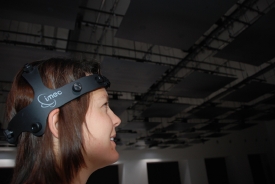IMEC and its research affiliate Holst Centre have unveiled a miniaturized and wireless 8-channel EEG system. The system is suited for remote monitoring of patients in their daily environment, resulting in more natural readings and greatly increasing the patient's comfort.
 IMEC's 8-channel wireless EEG scanner for ambulatory monitoring. The EEG monitoring system is in this case used in the Steel Sky (www.staalhemel.com) project which gives an acoustic representation of the electrical brain activity.
IMEC's 8-channel wireless EEG scanner for ambulatory monitoring. The EEG monitoring system is in this case used in the Steel Sky (www.staalhemel.com) project which gives an acoustic representation of the electrical brain activity.
The EEG system can be connected to individual electrodes, standard EEG monitoring hats or proprietary EEG headsets. The system records high quality EEG signals when connected to gel electrodes. Early tests with dry electrode are promising, although more research is required to achieve reliable measurement in non-controlled environments. The data is wirelessly transmitted in real-time to a receiver located up to 10m from the system. IMEC has also developed algorithms to interpret the brain signals, linking the brain activity to the degree of relaxation.
Applications that can be envisaged with this EEG system are, for example, comfortable ambulatory monitoring of epileptic patients, e-learning and gaming.
At the heart of the system is IMEC's 8-channel ultra low-power analog readout ASIC (application-specific integrated circuit). The electronics, including ASIC, radio, and controller chips are integrated on a printed-circuit board that measures only 47mm by 27mm. The whole system is packaged in a small box with status LEDs, a switch button and interfaces for din32 cables. The packaged system consumes only 1.8mA, allowing over 3 days of autonomy with a 160 mAh Li-ion battery.
Today, IMEC and the art centre STUK in Leuven present Staalhemel (Steel sky), a work of art by Christoph De Boeck (°1972, Belgium). Staalhemel is composed of 80 steel segments suspended over the visitors' heads. Visitors wear a headset with IMEC's EEG system, monitoring their brain signals. As they walk through the space, tiny hammers tap rhythmic patterns on the steel plates, activated by their brainwaves. This responsive environment confronts visitors with an acoustic representation of their electrical brain activity (www.staalhemel.com).
Within the Human++ program, IMEC and Holst Centre develop solutions for an efficient and better healthcare. Intelligent body area networks with wireless sensors, such as this EEG, promise to be a solution for more comfortable healthcare systems. This will allow ambulatory monitoring of people, which increases the comfort level of patients and is a cost- and time-efficient alternative for current EEG monitoring systems. And, home monitoring results in daily life measurements that cannot be measured in a clinical environment. Industry can get access to this technology by joining the Human++ program as research partner or by licensing agreements for further product development.